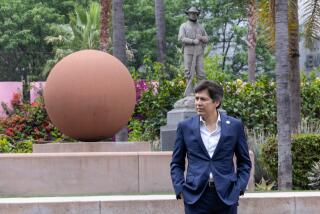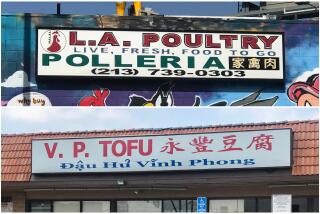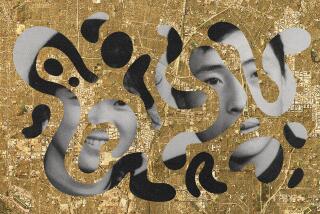‘Little India’ Fights for Recognition
Enter Artesia along Pioneer Boulevard and the strip malls are crowned with the familiar logos of McDonald’s and Starbucks.
But a few blocks farther on, the English-language signs give way to delicate Indian script as the smells of mustard and cumin seeds waft in the air. The boulevard is lined with Indian restaurants, spice markets and stores specializing in South Asian jewelry and henna tattoos.
Merchants over the last 20 years have transformed this stretch into Southern California’s largest concentration of Indian businesses, a place that draws South Asians and others to Pioneer Boulevard to dine and shop.
So, shop owners thought it would make perfect sense to formalize the neighborhood’s identity by having Caltrans erect exit signs on the freeway welcoming people to “Little India.”
But efforts by the local assemblyman to post the signs have turned into a nearly two-year ordeal that has divided the city and is playing out this week in the state Legislature.
The shop owners say they should be recognized for their contribution to the city. The signs, however, are opposed by the Artesia City Council as well as some community groups and non-Indian business owners. Those critics say the “Little India” name would give the erroneous impression that the city is composed mostly of Indian Americans, a group that makes up less than 5% of the population.
Some of the strongest opposition has come from the city’s powerful Portuguese community, whose dairy-farming ancestors helped found the city.
“A lot of Portuguese ... built this city,” said Brian Garcia, 22, whose parents moved to Artesia from Portugal before he was born. “The city pretty much sprouted on all these people’s backs.”
The long-running controversy frustrates Assemblyman Rudy Bermudez (D-Norwalk), who is sponsoring the sign legislation and believes the “Little India” moniker would help generate business for both Indian and non-Indian retailers.
Already, more than 25% of Artesia’s sales tax revenue is generated by Little India, he said.
“It’s been called this for decades now. It’s been on television, in magazines. It’s not something new,” Bermudez said. “A lot of cities would fight to have a destination point to attract money to their cities.”
Bermudez originally proposed the signs last year but dropped the idea because of the state budget crisis. He resubmitted the bill this year, and the Senate passed it Tuesday. Now Bermudez and the Indian community are waiting for the Assembly to do the same -- with luck, the assemblyman says, before the legislative session ends this week.
While the Legislature debates the measure, shop owners said it’s about time their neighborhood won some exposure.
Bhupinder Singh Batra, who has owned Bombay Spices on Pioneer Boulevard for 20 years, said he has seen the neighborhood grow from a few Indian shops to several blocks full of them.
“It will give more money to the businesses, to the city, and it will popularize Artesia itself,” said Batra, a smiling, gray-bearded man wearing a black turban. “It will not change Artesia. It’s only a sign on a freeway.”
Batra’s market is one of dozens of Indian stores in Little India.
Fuchsia and gold chiffon and crepe saris and pantsuits adorn the windows at Imaaj, one of many women’s clothing stores on the street.
Smells of curry and coriander drift from the open doors of the restaurants, including Udupi Palace. The vegetarian Indian restaurant serves specialty dishes that are hard to come by in other areas of Southern California, the manager said, such as sada rava dosa (thin, crispy crepes with cream of wheat and rice) and medhu vada (fried lentil doughnuts).
Batra recalls that when he opened his store, there were a handful of Indian-owned shops on the street and hopes that more would come.
“We thought [there] might be more improvement and more stores, but in the next few years, it started growing,” Batra said. “The city got more of everything because of that. We revitalized it.”
But to others, “Little India” signs would sell Artesia short.
They say the city of 16,000 is a diverse mix of whites, blacks, Latinos and East Asians as well as South Asians.
The area was developed in the 1920s by Dutch and Portuguese dairy farmers. The Portuguese community remains a force in Artesia and has been among the most vocal critics of the Little India signage.
A few blocks from the line of Indian shops stands the tile-roofed Artesia DES Hall, the Portuguese community center on Ashworth Street.
The hall (DES stands for Divine Holy Spirit in Portuguese) has been the center of Portuguese life in Artesia since 1927, and even has a bullfighting ring in the back.
Locals come to the center drink, socialize and play dominoes every day.
Garcia, who has lived in Artesia his entire life, proudly walks down his street, pointing out the various houses.
“They’re Dutch,” he said of one family. “They’re Portuguese, they’re Portuguese, they’re Dutch,” he continued.
Garcia said the common sentiment among the Portuguese community is that no one ethnic group in the city should be awarded a special distinction.
A few years ago, when it was proposed to change the name of Ashworth Street to commemorate the Portuguese, the community was against it because of the city’s diversity.
Garcia said that even though it is widely known that the Indian community “cleaned up” Pioneer Boulevard, putting up the signs would send the wrong message.
“Artesia is a really small city. That’s the only freeway we have,” he said. “If they designate that ‘Little India,’ [Artesia] pretty much becomes Little India.”
Despite the two years of bickering, Bermudez believes the Little India signs will become a reality this year.
The Assembly is expected to pass the bill, which would require private donors to fund the two signs -- one for each direction of the freeway.
Bermudez said there are people who have promised to sponsor the signs.
“Some people are misinformed as to what the bill does,” Bermudez said.
“The bill does not change the name of the city. The bill does not change the name of Pioneer Boulevard,” he said. “What it merely does is create a directional sign on the exit to one of California’s finest destinations.”
More to Read
Sign up for Essential California
The most important California stories and recommendations in your inbox every morning.
You may occasionally receive promotional content from the Los Angeles Times.









